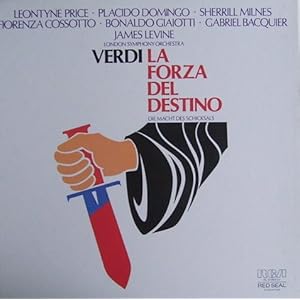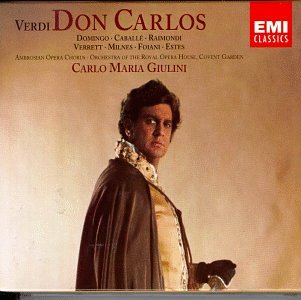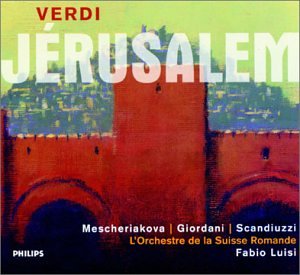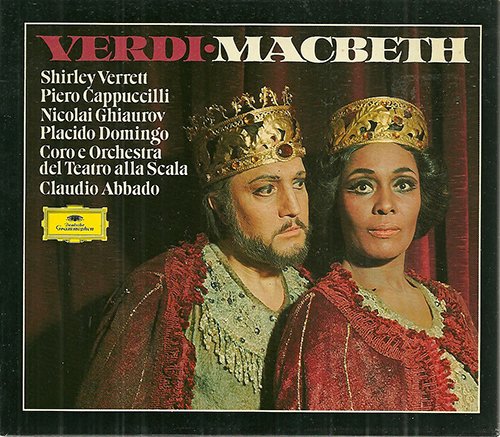Tutto Verdi
Posted by: EJS on 02 March 2013
1813 was not just the year Wagner was borne; it was also the birth year of greatest Italian opera composer of all time, Giuseppe Verdi. Similar to the Wagner thread, thought it would be nice to give the man his own space.
I'm a huge admirer, and over time have heard most of his works on record or in the theatre. I currently own many of his works on CD, but try to avoid duplication for all but the greatest works. Let's hope we get to cover his complete works in this thread.
Let's start with his ninth opera (out of 37, give or take a few revisions), because that's the one I happen to be listening to now (this is a copy of an earlier entry in the "what are you listening to..." thread with a few added bits and pieces).

Attila is one of Verdi's middle period operas, his self-professed 'galley years'. It was first performed in 1846 in Teatro La Fenice, Venice. A dramatic story about the fall of rome at the hands of a surprisingly genteel Attila, which is not great but nevertheless light years beyond the average libretto of previous generations, is set to excitable, tuneful music. All of Verdi's operas are IMO at least as good as the best that Bellini and Donizetti came up with (excepting a few key works, like the excellent Lucia di Lammermoor), and this one is no different. However, at this point in his career Verdi had not yet mastered the ability to give every aria, duet, ensemble or other piece of music its individual signature. As Richard Osborne has said in his recommended volume on Verdi, you could take any aria from Attila and insert it in Lombardi, Alzira or La Battagli di Legnano, and it would make musical sense. That is not possible with any part of Rigoletto or any of the operas that would follow.
Now - within that group of exchangeable operas (roughly starting with I Lombardi and ending with Aroldo), Attila is one of the better ones: musically and dramatically more coherent than the others, and relatively few uninspired episodes. If you're coming new to Verdi, it's actually an excellent choice, lots of great tunes and nice roles for soprano and bass.
Two great recordings exist: Gardelli with Ruggero Raimondi and Christina Deutekom, and Muti with Ramey and Studer. Overall, I prefer Muti for its conducting and a magnificent Cheryl Studer.
Cheers,
EJ

La Forza del Destino ("The power of destiny") (1862 Sint Petersburg; revised 1869 Milan), is one of Verdi's mature masterworks. It is a sprawling story about revenge, with destiny (chance?) as a plot device - there really is no other reason why Leonora, Alvaro and Carlo keep bumping into each other.
Quite a few worthwhile recordings exist of the revised version; none are perfect, but among the recommended ones is Molinari-Pradelli (one of Decca's earliest stereo recordings, and still sounding magnificent) with Renata Tebaldi and Mario del Monaco. Tebaldi is good, Del Monaco was a force of nature and sounds loud all of the time, which can get tiring - but it is undeniably a unique voice, unlike any today. The first true Verdi spinto soprano to try the role on records was Leontyne Price. She made two recordings, one with Thomas Schippers and later with Jimmy Levine, both for RCA. She is undeniably in better voice in the Schippers recording, but Richard Tucker is no match for Placido Domingo in his early prime. Similarly, Levine outconducts Schippers. Levine is, on balance, my favorite. More recently, Riccardo Muti did a live recording in La Scala (with a miscast Mirella Freni). Giuseppe Sinopoli deserves special mention: his conducting has moments of genius and his hero, Jose Carreras, sounds good. Unfortunately, his Leonora, Rosalind Plowright, sounds healthy but boring, and the editing kills the recording: there is a small pause between numbers which completely robs the recording of any tension (perhaps this is corrected in reissues; I own the original issue).
Cheers,
EJ
EJ, I only have a few Verdi Operas and of course the Requiem. What little I do have I like very much. This thread along with his 200th birthday party this year may just be the impetus for me to expand and continue to learn more about Verdi.
From your learned perspective, what do you think of this set with the complete recordings from Decca, DGG, Philips and EMI? Comes with all 30 operas, The Requiem, and the other miscellaneous works such as his String Quartet. The biggest drawback it would seem might be the lack of any libretti period? Or is it better to cherry pick and get only a few select recordings?
Is Verdi generally all very high energy like the opening of this video? It's very gripping and full of excitement. I think one has no choice but to play music like this very, house shaking like, loud. My neighbours already have to put up with a lot and this just might finish them off ![]()
https://www.youtube.com/watch?v=hxDoldFID4s
Regards,
Doug

Hi Doug - this box set generally provides great performances, more so than any other boxset in the past that I'm aware of. There are a couple I would have selected differently and also some inspired choices, e.g. Solti's Ballo and Chung's Otello. I would think libretti are easily found on the web, nowadays. Most of my recordings came with one, but they're all locked up on the attic because I lack the storage in the living room.
As with any box set, if you like what you hear and start hunting down alternative recordings, you may find over time that you prefer only a subset of what's in here. However, some middle period operas are otherwise difficult to come by.
Cheers,
EJ
Rigoletto, Verdi's 16th opera (not counting Jérusalem) is one of Verdi's undisputed masterworks, according to many his first - although he did write Nabucco and Luisa Miller before, both not to be discounted. It's a dark work, about a hunch-backed court jester whose daughter is seduced by the count; the jester (Rigoletto) hires an assassin but his plan backfires when his daughter is killed instead. The focus of the story is on the characters and particularly, the touching relationship between Rigoletto and Gilda.
The opera has attracted every baritone in the field who could sing the part and some who couldn't (Fischer-Dieskau didn't have the voice but this didn't stop him record the part for DG), and every tenor (the famous aria La Donna e Mobile is from this opera), but equally important are the soprano and the conductor.
The recording that's never mentioned is a fairly recent one, by the Metropolitan forces under James Levine, with Vladimir Chernov as Rigoletto, Pav as the duke and Cheryl Studer as Gilda. Levine is the greatest asset here, combining drama and the lyricism in a way that more famous conductors, like Cellini, Giulini or Kubelik couldn't manage. Chernov has some uninspiring moments, but he's generally contending in the top league with his beautifully burnished voice, here at its prime. Pavarotti had by this time slightly dried out but he's much more the team player than in his earlier recordings. Studer apparently had great difficulty with the role's high notes, and indeed those high notes barely squeek by, but her portrayal is believable. Overall, this is not the best Rigoletto but it is the best underdog.

https://www.youtube.com/watch?...ge&v=inXdvhq7zTc
https://www.youtube.com/watch?v=oQ3ZkZ3qTgQ
Cheers,
EJ
When I was a kid, I had an 80 speed one-sided old gramophone disc that I played on our cheapo family record player (a Zenith, as I recall) with 78 speed, of Enrico Caruso singing "La Donne e Mobile."

Oberto, conte di San Bonifacio was Verdi's first. The influence of Donizetti is easily heard in this early work, but Verdi immediately established himself with an opera that is really rather good, with plenty of the cantilenas which would become his trademark and confrontations as only he could write them.
Also here, only a few recordings but this one is great. Marriner always was a great conductor of opera and he shows he has the Verdi flow here. This recording launched - soft of - Stuart Neill, benefits from two good ladies in the cast, and has Sam Ramey on good form.
Cheers,
EJ

Il Trovatore came after Rigoletto but stylistically points to his earlier works instead of the future. We're back to complicated plotting and individual arias, ensembles, choruses etc. However, it has been argued that Verdi in this opera captured what he could do really well as best he could, before moving on to new pastures. It's one of his most tuneful works. Difficult to sing, too: it's been a tradition to list the singer requirements as 'the four best singers in the world'.
A great many recordings to choose from, going back to the early days of recording. A commonly named reference is the old recording under Zubin Mehta with Leontyne Price and Placido Domingo; but it was supposedly recorded in awful sound, and I can confirm that the CD will only confirm the beliefs of those that believe vinyl is better.
A recording I particularly like is even older, with Mario del Monaco and Renata Tebaldi. Tebaldi was Callas' great rival, more a media thing than reality as the ladies rarely sang on overlapping territory. THe recording got some fame by an incident: Del Monaco, worried he would ruin his voice, asked the conductor to play his cabaletta Di Quella Pira at a (commonly accepted but unwritten) lower pitch. Erede said yes, did no and Del Monaco sang at the original pitch resulting in the most thrilling version of the cabaletta on records.
This morning I woke up the kids with this one. Mehta's and Pavarotti's second recording was made after a series of performances in Florence in 1991. THe standout performance is by the aging Shirley Verrett, who gives a masterclass in Verdi singing even if her voice had developed some hoarseness by this time. Pav and Nucci are doing well and both are in great voice. I don't know the soprano beyond this recording, but she is good enough not to embarrass her cosingers and that is really quite good. Mehta is a variable conductor, but he does a good Trovatore. The individual parts may not be up to the best, but the sum of the parts in this case is greater and this is one of my favorite recordings.
Less controversial: Giulini, with Domingo should definitely be heard as well. It's a slower, more considered performance slightly marred by less than ideal singers (beyond Domingo).
Cheers,
EJ


Giovanna d'Arco (1845), Verdi's seventh opera is another opera from Verdi's early middle period, his 'galley years'. Musically, it is full of rousing numbers, excited choruses and Verdi's distinctive arias. It has a great lead role for soprano, and has been performed relatively often compared to, say, Alzira or I Masnadieri. This recording has a golden cast: Caballe, Domingo, Milnes and the Ambrosian Opera Chorus. This early in his career, Levine was crude but effective. The recording quality, or at least this remastering (I have the first CD issue), is rather metallic and shrill.
Cheers,
EJ

Don Carlos is one of Verdi's great works. Originally conceived as a French Grand Opéra, on a French libretto, it was first performed in 1867 in Paris and the following year, in its familiar Italian translation, in London. As of the first performance, it was heavily cut to keep the length to reasonable proportions. In 1883, Verdi had had enough and, together with his librettist, prepared a four act version, discarding the first act but keeping some of the best material for later moments in the opera. This new French version was translated in Italian again, and presented in this form in 1884. In 1886, in Modena, the 1884 version was presented together with the original first act, and it is in this format that the opera is most widely known today.
The work has been recorded often, and with relatively good results across the board. After Giulini had performed the work in London, EMI gave him the chance to record the 1886 version with a young cast of talented singers, and this recording has dominated the field since. Domingo, Caballe, Milnes, Raimondi and Verrett were all at the start of their careers and sound fantastic.
A few years earlier, Solti had made his, almost equally famous, recording with a largely veteran cast, and that recording is also recommended. Solti's two basses are unequalled, but his other leads don't hold a candle to Giulini's.
Early 80s, Abbado recorded the 1886 version in the original french, with a largely Italian cast. For the french, and Ricciarelli, it was controversial from the start but it, in Gramophone's words, is a trailblazer of a performance, and on balance my favorite.
Many other good recordings exist, of the 1867, 1884 and 1886 versions. Of note are Pappano's live uncut 1867 performance, and in particular, Haitink's 1886 made after a series of performances in London.
Cheers,
EJ

This recording was made as part of Sony's deal with the Metropolitan opera in the 90s. There are no surprises in the casting: Domingo, Chernov, Morris, Millo and Zajick were series regulars, and so was Levine at the helm. Also in line with the rest of the series, the quality of singing and playing is very high, just lacking the last ounce of atmosphere (the chorus especially sounds committed but generic, whether as soldiers or gypsies). Domingo was audibly stretched by this role at this point in his career but is still head and shoulders above most who tried to sing this role past and present, and we should not take him for granted. The others are very fine. Levine conducts a swift performance, which suits this opera well.
I haven't listened to this in 15 years or so, and it is a pleasure to revisit it again after all this time.
Cheers,
EJ

Jérusalem (1847) is a reworking by Verdi of his earlier opera I Lombardi (1842), for Paris, and represented Verdi's first foray in the French music scene. The change of language and setting required many changes to the libretto as well as the music, but importantly, Verdi took the opportunity to cut material from I Lombardi which was unhappy with, and added new music and the required ballet. The result is a more dramatically and musically coherent opera.
Like in much early Verdi, we are not spoilt for choice in terms of recordings, and we're lucky to have this one, made by Philips as part of their intention to complete the series started by Lamberto Gardelli in the 70s (they never made it). The performance, in Italianate French, is good, while not touching the supreme excellence of the earlier recordings. I was a bit mwah at first but over the years have started to really enjoy this performance. Among the singers, especially Marcello Giordani impresses. Fabio Luisi does some of his best early work here.
Cheers,
EJ

Macbeth (1st version 1847; revision 1865) was Verdi's tenth opera and his first to be based on Shakespeare. The opera was unusual for its time for its dramatic quality, and not featuring a single love duet. For the role of Lady Macbeth, Verdi expressed a wish for a singing actress, who didn't have to possess of a nice voice. Verdi considered it as one of his best and dearest.
Many good recordings of this opera. Leonard Warren and Leonie Rysanek on RCA (mono) is brilliant; the 70s and 80s brought recordings from Abbado, Muti (with Sherrill Milnes) and Chailly (with Leo Nucci). Sinopoli looks interesting, but I haven't heard it.
On balance, the Scala performance from the 70s with Piero Cappuccilli as an angst-ridden but powerful Macbeth is unbeatable. Abbado paces to perfection and his cast is strong down to the smallest parts.
Cheers,
EJ
Luisa Miller (Verdi's 15th, 1849) is considered Verdi's first opera from his middle period. Although Verdi has not written any bad operas, some are better than others. But as of Lucia, all his operas are very good-to-great (excepting the clunker that is Aroldo, a censorship-induced rewrite of Stiffelio). Luisa Miller shares much of its sound world with Rigoletto and Trovatore, in particular the last act. All its musical 'numbers' are instantly recognisable and cannot be confused to belong in different operas.
Many recordings exist, but mostly have all but disappeared from the scene. One of the best is still readily available, however:

This 1976 recording finds all principals in fine voice and was recorded with exceptional quality. Peter Maag's conducting is widely praised but I find him a bit anonymous. The other small downside is Pavarotti, who occasionally sounds too affected.
Another recording that should not be overlooked, is Maazel's 1980 performance with Domingo and Ricciarelli, made in conjunction with a run in Covent Garden. Maazel for sure on his bluntest behaviour is not for everybody and tends to emphasize the humpahpah in some of the bridge sections, but there is no doubt he, Ricciarelli and Domingo are on a roll.
Cheers,
EJ
